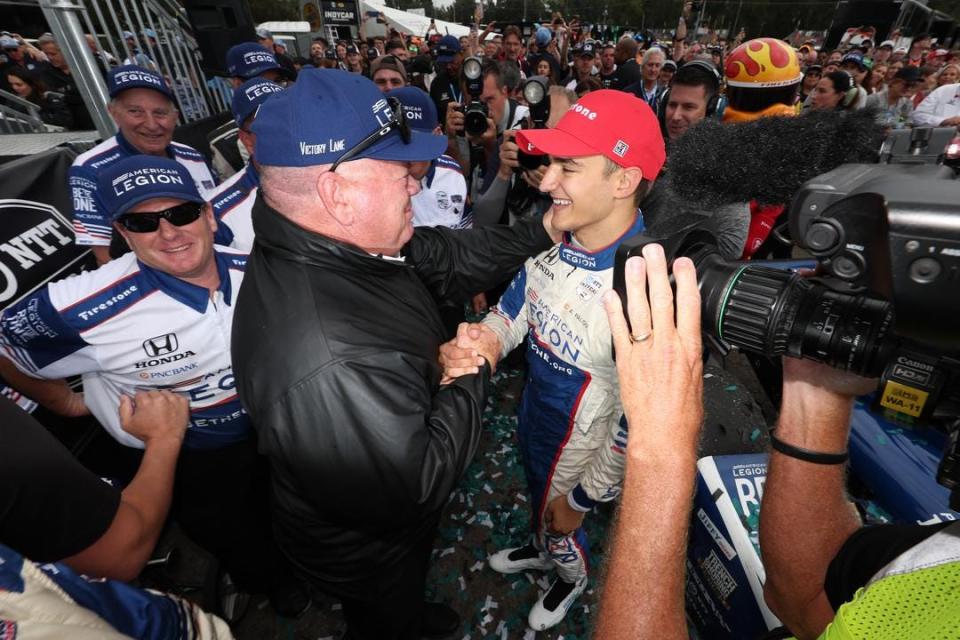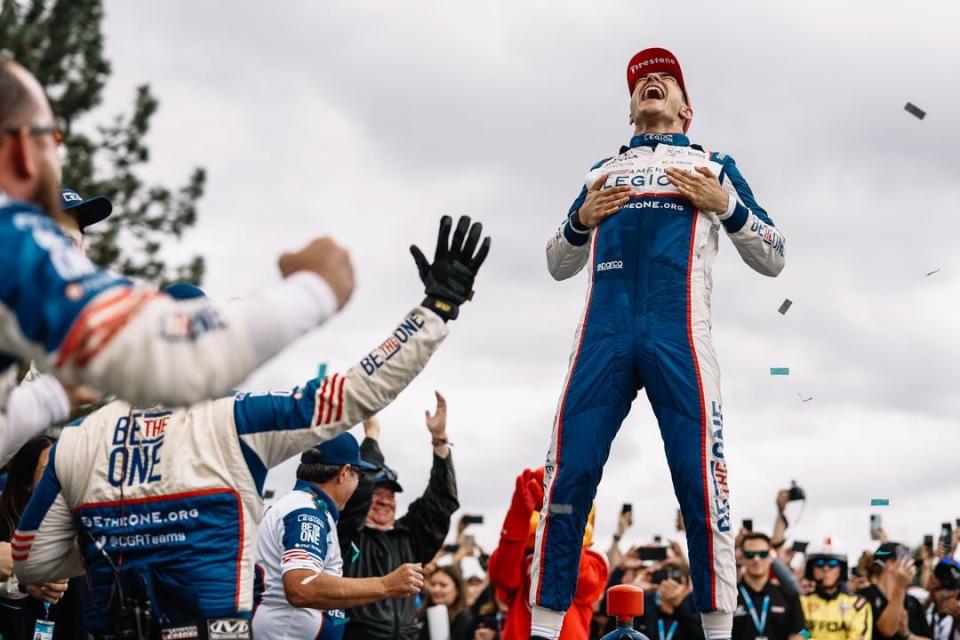With 2nd title in 3 years, future now public, Alex Palou on the way to becoming CGR legend
There was no formal press conference. No press release – truly ironic, considering one started all this nearly 14 months ago. And Alex Palou himself wasn’t even comfortable saying the news out loud post-race when asked. But for a driver who continues to put himself in the most rarified air Chip Ganassi Racing and the IndyCar series has to offer, the 2023 champ’s team owner left no doubt about Palou’s short-term future.
“Palou is going to be in our car next year, I can tell you that for sure,” Ganassi told NBC’s Kevin Lee after Palou dusted the field in Sunday’s Grand Prix of Portland, clinching his second championship in three years.

No ‘if he has no Formula 1 offers’ or ‘if he wants to’ clarifiers needed, despite Palou’s recent sketchy history with contracts and continued dalliance with his lifelong dream of racing at the pinnacle of motorsport. After all the mess of lawsuits (including those still ongoing), contracts, press releases, lawyers and statements, there was no need to spell things out any clearer.
And frankly, why should there be, considering this potentially once-in-a-generation pairing seemed like the right fit all along, even if it took the most circuitous and confusing ways to get here?
Because at just 26 years old, Palou is now a two-time champion, something only Sebastien Bourdais, AJ Foyt, Sam Hornish Jr. and Louis Meyer matched. The Spaniard has nine wins through less than four seasons – with the track he won at a year ago by more than 30 seconds left on the calendar. Only 12 drivers have won more championships in major American open-wheel racing. Through a driver’s first 63 starts, only Foyt and Mario Andretti recorded more wins or podiums.
Not even that historic pair racked up more top-10s.
And though it’s not always clear in his affable public persona, there’s no one who wants any and all of that more.
Insider: How Alex Palou wrapped up his 2nd IndyCar championship with 1 race left

“Before the race, we had a meeting, and Chip was very aggressive telling us we had to win, so I was like, ‘Alright, let’s win then,’” Palou said post-race. “And so before I jump in the car, he’s there with me and says, ‘OK, let’s have a good, clean race. Just manage your position.’
“And I said, ‘No, Chip. You told us to win, so I’ll go ahead, and I think we can win this.’ It was just one of those races where I knew we had everything we needed to win the race. We didn’t go into safe mode to stay with (3rd-place finisher and championship runner-up Scott Dixon) because we thought we could win the race today, and we did. I’m just happy that all worked out.”
Such confidence in perhaps IndyCar’s most competitive age to date, is increasingly rare. Dixon’s dominance of late, with back-to-back wins that helped keep the championship mathematically alive, came from a pair of methodical fuel-saving masterclasses that chipped away at teams’ and drivers’ hopes lap by lap – never all at once.
Josef Newgarden’s dominance on ovals – five wins in the last six and all but one this year – is a mastery on one discipline. But the way Palou went and won nearly half of every road and street course race in 2023 on surfaces rough and smooth, flat and undulating, short and long was utterly dominant in a way this series so rarely sees.
Even Dixon, who was Palou’s best foil until an untimely caution gave Felix Rosenqvist hope to secure the second spot on the podium, was muted in his frustration with IndyCar race control painstakingly delaying its final caution call that favored the Arrow McLaren driver over him.
Sunday, Dixon saw what was inevitable.

“IndyCar keeps doing this, I think, thinking they’re trying to help, but it hurt and affects the outcome of the race,” Dixon said of the way race control paused to throw the yellow for Agustin Canapino’s off-track excursion that left him in what Dixon called one of the more dangerous parts of the track, all so Rosenqvist wouldn’t be caught out having not pitted with the rest of the field.
“But it would’ve only been one spot for us, and I don’t know that we had anything to catch Alex. He was definitely fast. He does everything right, and sometimes you have a season where everything rolls your way. He’s a hell of a competitor, a huge talent, and he’s got a great group that works with him who did a hell of a job.”
Among them include Palou’s crew chief Ricky Davis, now a five-time series champion after nearly 30 years with the team; the No. 10’s race engineer Julian Robertson, who spearheaded Dixon’s first championship with the team in 2003 and CGR’s first win overall in 1994; and strategist Barry Wanser, a 25-plus-year veteran of CGR who was absent Sunday recovering from surgery related to a recent skin cancer diagnosis. How long that trio, along with Palou, can stick around as the shining stars of the No. 10 entry is unclear. But with Palou back and their dominance of late, it’s hard to imagine anything standing in their way for 2024 and beyond.
“The guys screwing the car together know what they’re doing. The guys engineering the car to make it fast know what they’re doing, and the guys calling strategy know what they’re doing,” Ganassi said. “You pair it with a driver who knows what he’s doing, and it’s a formidable combination – even for guys on our own team to beat.
“I don’t care if they’re from Mars if they can win races, they’re going to be in our cars.”
And so here Palou seems destined to remain, a staple IndyCar fans of the future may think of in the same vein as Dixon or Dario Franchitti or Mike Hull or Ganassi himself when it comes to the core of Chip Ganassi Racing’s essence.
With a future jump to Arrow McLaren seemingly eliminated on the bad feelings alone, no reason to make sideways (Team Penske) or backwards (Andretti Autosport) moves in this series and a move to F1 perhaps gone with his ties to McLaren Racing and its CEO Zak Brown, Palou seems comfortable in his role as one of IndyCar’s old souls who seems primed to be around for a decade or two at the top of the sport, not unlike his teammate who, at least from a competition standpoint, stands in Palou’s shadow for now.

“I know I’m not 21 or 19. I’m 26, which is good. I’m not saying I’m old, but it’s just not super young,” Palou said. “Next year, I’ll be 27, and so even if an opportunity comes in the future, which is really, really small chances, sure, I’ll think about it, but I’m happy.
“Honestly, as long as I keep on winning championships and races and battling for championships, I’ll have a great career.”
This article originally appeared on Indianapolis Star: IndyCar: Alex Palou becoming Chip Ganassi Racing legend with 2nd title
